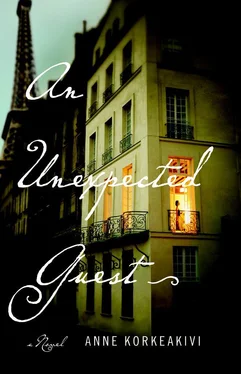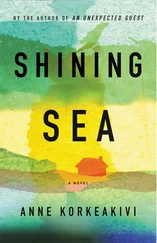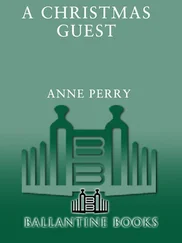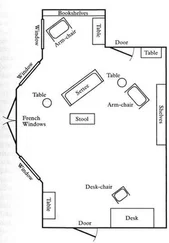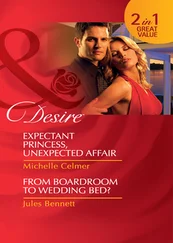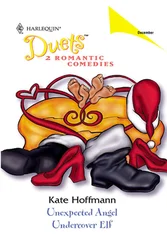Clare touched the fragile flat bell of a purple blossom with the tip of her finger and turned to address the charwoman, who she knew would still be staring at her.
“Très jolie,” she said.
“Oui, Madame.”
She adjusted her scarf and basket and continued across the courtyard. Every morning, she managed to push Niall away, his phantasmal arms still clasped tight around her from the night’s dreams. Now, buoyed by the spring breeze, she willed him to leave her entirely, until she was just another well-dressed middle-aged woman in a solid marriage with two almost-grown, healthy children. She wasn’t going to allow Niall to recede quietly into the back of her thoughts today. She wanted him out completely.
She nodded to the concierge, who stood talking with a coworker in a corner of the entrance gateway, both wielding brooms like medieval soldiers ready to sally forth in battle, and let their sudden silence glance right off her. Not gossiping about us, at least, she thought. What would there be to say? By now, they knew she was an American. Other than that, she’d made sure that she and her family would make disappointing fodder for chatter: the children were reasonably well behaved, at least in public; the father spent nights in his own bed; she came home with shopping bags from the right boutiques, neither too many nor too few. The previous inhabitant of their apartment had enjoyed his drink more than was customary even for a diplomat. Worse, his wife, though only in her forties, had been at least fifty pounds overweight and, of marginally aristocratic country stock, had donned galoshes whenever it was wet, which in Paris was often. Even being American seemed mild next to such transgressions.
The Rue de Varenne was empty, as usual outside rush hour, but for the pairs of gendarmes stationed along it like pats of butter on bread plates the length of a formal dining table, assigned to guard the many buildings like theirs on the street that housed governmental offices or official residences. The French prime minister lived in the grandest building of all, at number 57; the Italian Embassy in Paris stood at numbers 47–49–51. The French minister of agriculture and French secrétariat général du gouvernement occupied, respectively, numbers 78–80 and 69. The rest of the seventh arrondissement hummed with visitors, thanks to the Eiffel Tower and Les Invalides, but on the Rue de Varenne, her street, tourists stuck to the beginning stretch by the Rodin Museum, wandering on and off the narrow sidewalk before it in the dazed manner so particular to the idle in Paris, returning to reality only at the chiding of a taxi or limousine horn but rarely making it as far even as the front gates of the building that housed the British minister’s residence, just a coin’s throw down from the museum.
From the Residence, the street continued in a long, nearly straight line, the cobblestones of the sidewalk just slightly uneven. Solemn gray and beige stone facades flanked either side of the road in a unified front. Edward had once commented on how well Clare fit in here, and she’d known he meant this as a compliment. She was pale, smooth, beige, a sea pebble of the kind one picks up along the beach and slips into one’s pocket to run one’s fingers over while pondering the meaning of life — or where to eat dinner. She knew it, she had even cultivated it — as much as she had ever manufactured anything about herself, for her development had been more like an act of erosion, a sanding away of all extraneous or undesirable elements, and this was how she felt more and more, as though each year were a grand wave washing away a little more of her. But something in her had begun to balk at the sentiment. Edward’s compliment had left her feeling deeply wounded, and she’d never forgotten it.
Now, however, she looked up and down the Rue de Varenne, not to judge the validity of Edward’s remark, nor to see if anyone was hovering about, as had been suggested as a simple precaution in one Foreign & Commonwealth Office post report, but to soak in the sunshine and attendant feeling of optimism. She left all second thoughts behind her, forced aside anything negative. The only things on her mind were the flowers and cheese and new asparagus from Alsace she needed to buy. She’d heard from other wives that there was a daily covered market in the Marais district that attracted vendors of fresh produce from all over France, but its name, Marché des Enfants Rouges, troubled her; translating as “market of the crimson children,” the name left her with visions of an enormous cage filled with children stained red, as though their little bodies had been dipped in blood. In the almost four years they’d now been living in Paris, and in the three years they’d lived here back in the ’90s, she had kept her distance. She would count on finding the asparagus at Le Bon Marché department store’s food hall, as well as the oatcakes and Irish cheddar she planned to serve as a subtle reminder to the P.U.S. of her heritage and confirmation of Edward’s Irish interests.
But ordering the flowers came first. An excellent florist stood on the Rue Chomel, near the end of the Rue de Varenne. She started down the street, nodding as usual to the first group of gendarmes she passed. The young gendarme with apple cheeks and a knobby neck was in his shirtsleeves in the brisk spring sunshine, an act of bravado that did not surprise her. He and his partner nodded back at her; the guards always did, except for whichever duo might be stationed in front of the prime minister’s residence. One or two might even touch the small blue box with a visor they wore atop their heads in guise of an actual cap. “They’re flirting with you,” Edward had commented one obscure Sunday morning when they had breakfasted at a café. Mathilde, perhaps in an act of vengeance, had used the last of the milk, leaving them either to face Edward’s tea and her coffee black or go out for breakfast. “They stay poker-faced for me, I can assure you.” For a few weeks after, she’d avoided walking down the street and stopped greeting the guards when she did, fussing with her handbag or buttons as she passed by them, until she’d woken up to the absurdity of such behavior. She was forty-five, a wife and a mother. She was past feeling shy or flirtatious.
She quickened her pace. Of course, she could have called in an order to the florist, but as with the asparagus, choosing them herself was better. That way she could be assured of their quality. The first time Edward had visited her after they were introduced over an uncomfortable luncheon with her father and one of her father’s Irish-American colleagues, he’d brought a large bouquet of lilacs to the dilapidated town house she was sharing with other recent college graduates in Washington, D.C. He was living in Washington then, too, posted there for the Foreign Office and already in his thirties. Though she’d hoped he wouldn’t realize it, she’d seen right away that the flowers were no good and would never be any good; to this day, she remembered how sad they’d looked on the table. It had been March and too early for lilacs, even from a hothouse, and though the carefully trimmed and sprayed sprigs might endure without wilting, their delicate blooms would never open nor exude the sweet scent that makes lilacs precious. She’d cut them at a forty-five-degree angle and placed them in a vase filled with lukewarm water, but her heart had sunk even as it had risen at the promise of Edward’s gesture.
“Lilacs were amongst the very first flowers that the colonialists brought over from England,” he had said, watching her set them down on the center of her dining table. “But they originated farther east, in eastern Europe and Asia. Just one of the scores of wonders spread throughout the world by international trade.”
Читать дальше
